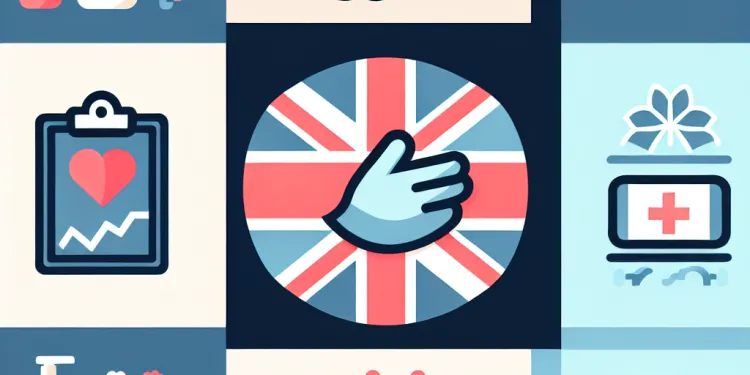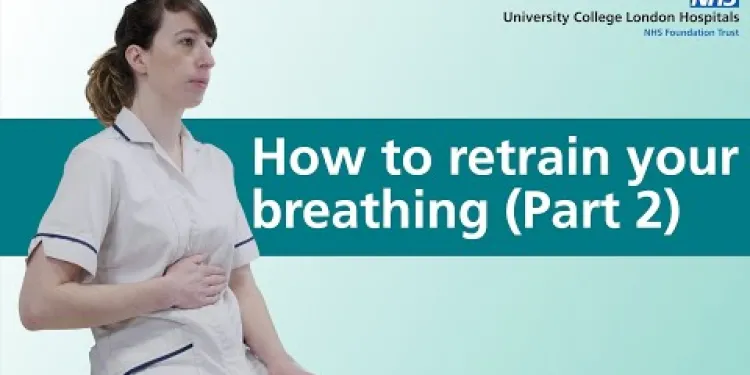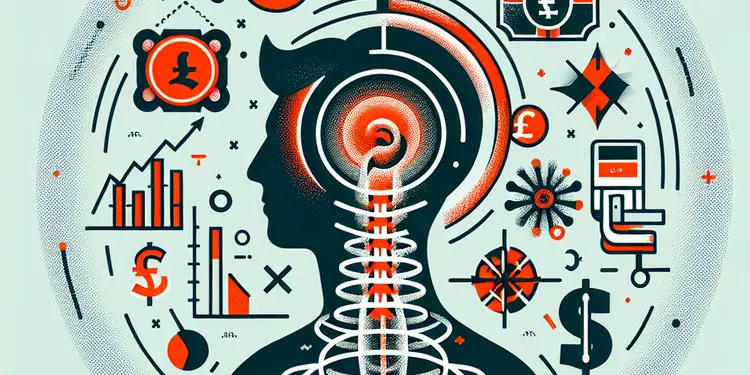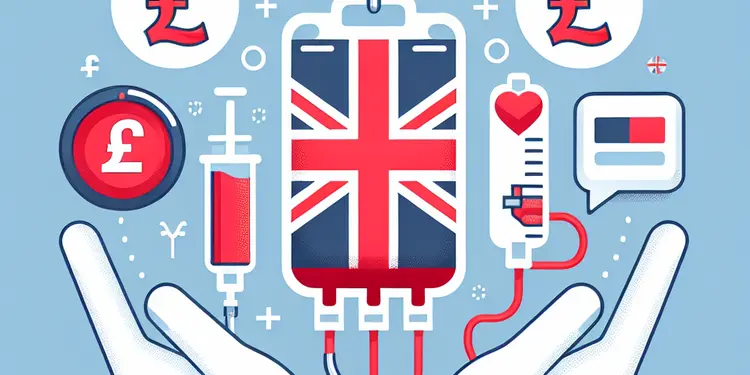
Find Help
More Items From Ergsy search
-

What are the symptoms of long covid?
Relevance: 100%
-

Long Covid
Relevance: 91%
-

Long COVID - Managing Breathlessness
Relevance: 79%
-

How to retrain your breathing | Part 2 | Asthma, long covid or breathlessness
Relevance: 64%
-

How long does it take for symptoms to appear?
Relevance: 56%
-
New Research Sheds Light on Long Covid Effects
Relevance: 55%
-
What are the benefits of getting a COVID jab?
Relevance: 52%
-

How long does immunity last after getting the COVID jab?
Relevance: 51%
-
Can the COVID jab give me COVID-19?
Relevance: 50%
-

How long do Chikungunya symptoms last?
Relevance: 48%
-

Are there any long-term side effects of the COVID jab?
Relevance: 47%
-

Are children more affected by new variants of COVID?
Relevance: 47%
-

How long do norovirus symptoms last?
Relevance: 47%
-
Should I get a COVID jab?
Relevance: 47%
-
Can air physiotherapy help with COVID-19 recovery?
Relevance: 46%
-
How do COVID jabs work?
Relevance: 45%
-

What sources should I consult for information on Covid-19?
Relevance: 45%
-

Are COVID jabs safe?
Relevance: 45%
-

How long do symptoms of whiplash last?
Relevance: 45%
-
Does the flu vaccine protect against COVID-19?
Relevance: 44%
-
New Covid Variant Strains
Relevance: 44%
-

Should I get vaccinated if I already had COVID-19?
Relevance: 44%
-

Can COVID-19 be transmitted through blood transfusions?
Relevance: 43%
-
Can I get the COVID jab if I am pregnant or breastfeeding?
Relevance: 42%
-
Who is eligible to receive the COVID jab?
Relevance: 42%
-
What is the Covid-19 Stratus variant?
Relevance: 42%
-

Will getting the flu jab protect me against COVID-19?
Relevance: 42%
-

Does the COVID jab affect fertility?
Relevance: 41%
-
What is a COVID-19 variant?
Relevance: 41%
-

Will I experience side effects from the COVID jab?
Relevance: 41%
-

Can I get the COVID jab if I have allergies?
Relevance: 40%
-
How are COVID-19 variants detected?
Relevance: 40%
-

How can I get a COVID jab appointment?
Relevance: 40%
-

How long do heart attack symptoms last?
Relevance: 40%
-

What are the Nimbus and Stratus variants of Covid?
Relevance: 40%
-
What are the COVID-19 travel restrictions for traveling to Spain?
Relevance: 39%
-
How do COVID-19 variants arise?
Relevance: 39%
-

What should I do if I experience side effects after the COVID jab?
Relevance: 39%
-
Do new variants affect COVID-19 testing?
Relevance: 39%
-

How can I protect myself from new COVID-19 variants?
Relevance: 38%
Understanding the Symptoms of Long COVID
Long COVID, also known as post-COVID-19 syndrome, represents a wide array of symptoms that persist for weeks or months after the acute phase of a COVID-19 infection has resolved. While most individuals recover completely from COVID-19 in a few weeks, some people, including those who had mild versions of the disease, continue to experience symptoms. This persistent condition has been recognized by healthcare systems in the United Kingdom as having a significant impact on individuals' daily lives, thereby necessitating awareness and understanding of its various symptoms.
Common Symptoms of Long COVID
Long COVID symptoms can vary widely, with some of the most common ones including persistent fatigue, shortness of breath, chest pain, and palpitations. Many people report feeling a level of exhaustion that significantly affects their ability to perform everyday activities. Respiratory symptoms, such as a lingering cough and difficulty breathing, can persist, making simple tasks challenging.
Neurological and Cognitive Symptoms
A significant number of individuals with long COVID experience neurological symptoms, often referred to as "brain fog," which includes difficulties with concentration and memory. Headaches and sleep disturbances are also frequently reported. These symptoms can be particularly distressing, impacting work and personal life due to impaired cognitive functioning.
Psychological and Mental Health Issues
Long COVID can also affect mental health, leading to increased levels of anxiety and depression. The stress of enduring prolonged symptoms, often with fluctuating intensity, can exacerbate these psychological issues. Mental health support is crucial for those suffering from these symptoms in order to manage and mitigate long-term impacts.
Gastrointestinal and Musculoskeletal Symptoms
Some individuals experience persistent gastrointestinal issues, such as nausea, diarrhea, or abdominal pain. Musculoskeletal issues, like joint and muscle pain, are also common and can lead to reduced mobility or discomfort.
Impact on Life and Management
In the UK, the NHS has established services to support individuals with long COVID, providing access to multi-disciplinary support teams to help manage the wide range of symptoms. Recognizing and validating these ongoing symptoms is a crucial step towards recovery. Individuals experiencing symptoms beyond the acute infection phase should consult a healthcare professional to assess and manage their condition effectively.
Understanding the Symptoms of Long COVID
Long COVID is when you still feel sick after having COVID-19. Most people get better in a few weeks. But some people keep feeling sick for a long time. Even if they only had a mild case. This can make daily life hard. It is important to know about the symptoms so we can help.
Common Symptoms of Long COVID
There are many symptoms of long COVID. The most common ones are feeling very tired and out of breath. Some people have chest pain or feel their heart beating fast. Feeling very tired can make it hard to do everyday things. Some people have a cough or trouble breathing, even with simple activities.
Problems with Thinking and Remembering
Many people with long COVID have problems with thinking, called "brain fog." This means it is hard to concentrate and remember things. Some people have headaches or trouble sleeping. These problems can be very frustrating and make it hard to work or do things at home.
Mental Health Issues
Long COVID can also make people feel anxious or depressed. It is hard to feel better when symptoms last a long time. This can be very stressful. It's important to get help if you feel anxious or depressed. Talking to someone or seeing a mental health professional can help.
Stomach and Muscle Problems
Some people with long COVID have stomach issues like feeling sick, having diarrhea, or belly pain. They might also have pain in their joints and muscles. This can make it hard to move around and be comfortable.
Getting Help and Managing Long COVID
In the UK, doctors and the NHS have services to help people with long COVID. They can offer support from different specialists to help with symptoms. If you still have symptoms after having COVID-19, talk to a doctor. They can help you manage and feel better.
Remember, getting help and talking about how you feel can really make a difference. You can use tools like calendars or lists to help remember things, and try to take breaks and rest when needed.
Frequently Asked Questions
What is long COVID?
Long COVID is a term used to describe the symptoms that continue for weeks or months after the acute phase of a COVID-19 infection has resolved.
How long do long COVID symptoms last?
The duration of long COVID symptoms can vary greatly; some people experience them for a few weeks, while others might have symptoms persist for months.
What are the most common symptoms of long COVID?
Common symptoms include fatigue, shortness of breath, chest pain, joint pain, and brain fog.
Can long COVID cause neurological symptoms?
Yes, neurological symptoms such as brain fog, difficulty concentrating, headaches, and sleep disturbances are reported by many people with long COVID.
Is fatigue a symptom of long COVID?
Yes, persistent fatigue is one of the most frequently reported symptoms of long COVID.
Can long COVID affect mental health?
Yes, people with long COVID may experience anxiety, depression, and post-traumatic stress as part of their symptoms.
Are there cardiovascular symptoms associated with long COVID?
Some individuals experience cardiovascular issues such as chest pain, palpitations, or changes in blood pressure.
Does long COVID cause respiratory problems?
Yes, people may have ongoing respiratory symptoms such as shortness of breath and persistent cough.
Can gastrointestinal symptoms be a part of long COVID?
Yes, gastrointestinal issues such as abdominal pain, diarrhoea, and nausea can occur in long COVID cases.
Is joint pain associated with long COVID?
Yes, joint pain is a common symptom reported by individuals experiencing long COVID.
How is long COVID diagnosed?
Long COVID is diagnosed based on a combination of symptoms, medical history, and ruling out other potential causes.
Can children experience long COVID?
Yes, though less common, children can experience long COVID symptoms, including fatigue, headaches, and sleep problems.
What should I do if I think I have long COVID?
If you suspect you have long COVID, seek medical advice from your GP to discuss your symptoms and explore management options.
Are there treatments available for long COVID?
Management of long COVID involves symptomatic treatment, rehabilitation, and sometimes specialist referrals. Ongoing research is focusing on specific treatments.
Can resting help alleviate long COVID symptoms?
Rest, pacing activities, and gradually increasing exercise can help some people manage long COVID symptoms effectively.
What is long COVID?
Long COVID is when someone feels unwell for weeks or months after having COVID-19. It is when the signs, like feeling very tired or having a cough, do not go away for a long time.
If you have long COVID, it's a good idea to see a doctor. They can help you feel better.
To make reading easier, you can:
- Use a ruler or your finger to help follow the words.
- Break the text into small parts and read slowly.
- Ask someone to read with you and explain the parts you find hard.
Long COVID is when someone still feels sick weeks or months after having COVID-19. Even when the main sickness is over, they might still have symptoms.
Tips to help:
- Talk to a doctor if you feel sick for a long time.
- Write down how you feel every day to help remember.
- Rest when you feel tired.
- Ask family or friends for help if you need it.
How long do long COVID symptoms last?
Some people feel sick for a long time after having COVID-19. This is called "long COVID."
How long you feel sick can be different for each person.
For some, it might be a few weeks. For others, it can be many months.
It is important to talk to a doctor if you feel sick for a long time. They can help you feel better.
Using tools like a symptom diary can help. You write down how you feel each day. This can help the doctor understand how to help you.
People can feel sick from long COVID for different amounts of time. Some people feel better after a few weeks. Others might keep feeling sick for months.
What are the common signs of long COVID?
Some common signs are feeling very tired, having trouble breathing, feeling pain in your chest or joints, and feeling confused or forgetful.
Can Long COVID Affect Your Brain?
Does Long COVID make your brain feel different? Some people with Long COVID have trouble thinking clearly. This is called "brain fog."
If you have this, you might find it hard to focus or remember things.
Here are some tips to help you:
- Take notes to remember important stuff.
- Use reminders on your phone or a calendar.
- Take breaks often to rest your mind.
Yes, many people with long COVID say they have problems with their brains. They feel foggy, find it hard to focus, get headaches, and have trouble sleeping.
Is feeling very tired a sign of long COVID?
People with long COVID might feel very tired. This can happen for a long time, even after they are better from the virus. If you feel this way, it can help to:
- Rest often and take breaks during the day.
- Do light activities like walking or stretching.
- Talk to a doctor if you feel very tired all the time.
Yes, feeling tired all the time is one of the most common signs of long COVID.
Can long COVID change how we feel and think?
Some people who have had COVID-19 can feel different for a long time. This is called "long COVID." It can make people tired or upset.
Mental Health: This means how we feel, think, and handle things. If someone's mental health is not good, they might feel sad, worried, or find it hard to pay attention.
People with long COVID might feel:
- Very tired a lot.
- Sad or worried more than usual.
- Confused or forget things easily.
If you or someone you know feels like this after having COVID-19, it can help to:
- Talk to a doctor or a nurse.
- Share feelings with a friend or family.
- Rest and take things easy when feeling tired.
Remember, it is okay to ask for help. There are people who care and can support you.
Yes, people with long COVID can feel very worried, sad, or scared because of what happened to them.
Can long COVID cause heart problems?
Some people with long COVID may have heart problems. These can include feeling very tired, chest pain, or your heart beating too fast or too slow. It is important to tell a doctor if you have these feelings.
If you have questions or feel worried, you can ask someone you trust for help. They can help explain things to you or go with you to see a doctor.
Try using tools like pictures or simple words to help you understand better. It might also help to write down what the doctor says.
Some people have problems with their heart and blood. They might feel pain in their chest, or their heart might beat too fast or uneven. Sometimes, their blood pressure changes a lot.
Can long COVID cause breathing problems?
Long COVID can make it hard to breathe. Some people feel short of breath or cough a lot.
If you have breathing problems, try these tips:
- Rest when you need to.
- Breathe slowly and deeply.
- Use a pillow to help you sit up comfortably.
If you are worried, talk to a doctor or nurse.
Yes, some people might have breathing problems that don't go away, like feeling out of breath or having a cough that stays.
Can tummy problems happen with long COVID?
Yes, if you have long COVID, you might get a tummy ache, diarrhea, or feel sick.
Does long COVID cause joint pain?
Long COVID can cause joint pain.
If you have joint pain, you can:
- Rest your joints
- Use a warm pack
- Ask a doctor for help
You can also ask someone you trust to help you understand these steps.
Yes, many people who have long COVID talk about having joint pain.
How do doctors know if someone has long COVID?
Doctors check if someone has long COVID by talking about their symptoms. This means how the person feels and if they are sick for a long time after having COVID-19.
Doctors might ask questions like:
- How long have you had these feelings or problems?
- Did you feel this way after you had COVID-19?
- What makes you feel better or worse?
The doctor may also do some tests to make sure it is not something else.
It's important to tell the doctor all your symptoms. Writing them down before you visit can help.
If reading is hard, you can use tools like apps that read text out loud.
Doctors figure out if someone has Long COVID by looking at their symptoms, checking their medical history, and making sure it isn't something else.
Can kids get long COVID?
Yes, kids can have long COVID.
Long COVID means feeling sick for a long time after having the virus.
Some kids might feel tired, have headaches, or find it hard to focus.
It's important for parents to talk to a doctor if they are worried.
Tools like pictures or simple charts can help kids understand what's happening.
Yes, sometimes children can have long COVID. This means they feel sick even after the virus is gone. They might feel very tired, have headaches, or have trouble sleeping.
What to Do if You Think You Have Long COVID
If you feel sick for a long time after having COVID-19, this is called Long COVID.
Here are some steps you can take:
- Talk to your doctor or nurse. They can help you understand what is happening.
- Write down your symptoms. This means making a list of how you feel, like if you are really tired or have aches.
- Rest lots and take care of your body. Eat healthy food, drink water, and sleep well.
- Ask for help from family or friends if you need it.
If reading is hard, you can use tools that read text aloud.
If you think you have long COVID, talk to your doctor. They can help you understand your symptoms and find ways to feel better.
Can you get help if you have long COVID?
Helping people with long COVID means treating the symptoms, helping them get back to their usual activities, and sometimes sending them to a specialist doctor. Scientists are still studying new ways to help.
Can resting help with long COVID symptoms?
If you have long COVID, you might feel tired or sick for a long time. Taking breaks and resting might make you feel better.
Ways to rest:
- Take naps during the day.
- Sit down when you feel tired.
- Make sure to get a good night's sleep.
Tools that can help you:
- Use a timer to remind you to rest.
- Keep a diary to track how you're feeling each day.
- Ask family or friends to help with daily tasks when you're tired.
Remember, it's okay to rest and take it easy. This might help you feel better.
Taking breaks, doing things slowly, and slowly doing more exercise can help some people feel better if they have long COVID.
Useful Links
This website offers general information and is not a substitute for professional advice.
Always seek guidance from qualified professionals.
If you have any medical concerns or need urgent help, contact a healthcare professional or emergency services immediately.
Some of this content was generated with AI assistance. We’ve done our best to keep it accurate, helpful, and human-friendly.
- Ergsy carfully checks the information in the videos we provide here.
- Videos shown by Youtube after a video has completed, have NOT been reviewed by ERGSY.
- To view, click the arrow in centre of video.
- Most of the videos you find here will have subtitles and/or closed captions available.
- You may need to turn these on, and choose your preferred language.
- Go to the video you'd like to watch.
- If closed captions (CC) are available, settings will be visible on the bottom right of the video player.
- To turn on Captions, click settings .
- To turn off Captions, click settings again.
More Items From Ergsy search
-

What are the symptoms of long covid?
Relevance: 100%
-

Long Covid
Relevance: 91%
-

Long COVID - Managing Breathlessness
Relevance: 79%
-

How to retrain your breathing | Part 2 | Asthma, long covid or breathlessness
Relevance: 64%
-

How long does it take for symptoms to appear?
Relevance: 56%
-
New Research Sheds Light on Long Covid Effects
Relevance: 55%
-
What are the benefits of getting a COVID jab?
Relevance: 52%
-

How long does immunity last after getting the COVID jab?
Relevance: 51%
-
Can the COVID jab give me COVID-19?
Relevance: 50%
-

How long do Chikungunya symptoms last?
Relevance: 48%
-

Are there any long-term side effects of the COVID jab?
Relevance: 47%
-

Are children more affected by new variants of COVID?
Relevance: 47%
-

How long do norovirus symptoms last?
Relevance: 47%
-
Should I get a COVID jab?
Relevance: 47%
-
Can air physiotherapy help with COVID-19 recovery?
Relevance: 46%
-
How do COVID jabs work?
Relevance: 45%
-

What sources should I consult for information on Covid-19?
Relevance: 45%
-

Are COVID jabs safe?
Relevance: 45%
-

How long do symptoms of whiplash last?
Relevance: 45%
-
Does the flu vaccine protect against COVID-19?
Relevance: 44%
-
New Covid Variant Strains
Relevance: 44%
-

Should I get vaccinated if I already had COVID-19?
Relevance: 44%
-

Can COVID-19 be transmitted through blood transfusions?
Relevance: 43%
-
Can I get the COVID jab if I am pregnant or breastfeeding?
Relevance: 42%
-
Who is eligible to receive the COVID jab?
Relevance: 42%
-
What is the Covid-19 Stratus variant?
Relevance: 42%
-

Will getting the flu jab protect me against COVID-19?
Relevance: 42%
-

Does the COVID jab affect fertility?
Relevance: 41%
-
What is a COVID-19 variant?
Relevance: 41%
-

Will I experience side effects from the COVID jab?
Relevance: 41%
-

Can I get the COVID jab if I have allergies?
Relevance: 40%
-
How are COVID-19 variants detected?
Relevance: 40%
-

How can I get a COVID jab appointment?
Relevance: 40%
-

How long do heart attack symptoms last?
Relevance: 40%
-

What are the Nimbus and Stratus variants of Covid?
Relevance: 40%
-
What are the COVID-19 travel restrictions for traveling to Spain?
Relevance: 39%
-
How do COVID-19 variants arise?
Relevance: 39%
-

What should I do if I experience side effects after the COVID jab?
Relevance: 39%
-
Do new variants affect COVID-19 testing?
Relevance: 39%
-

How can I protect myself from new COVID-19 variants?
Relevance: 38%


